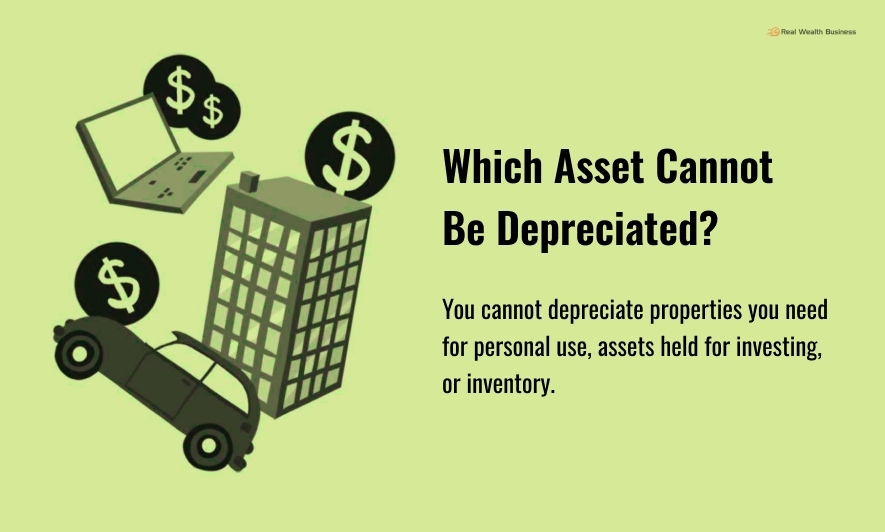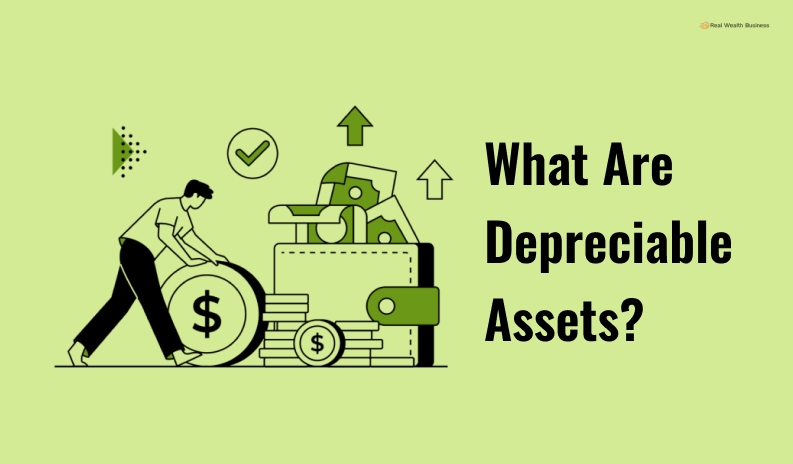Which Asset Cannot Be Depreciated? – Let’s Get The Best Answer
by Shahnawaz Alam Finance Published on: 14 June 2023 Last Updated on: 25 September 2024

Which asset cannot be depreciated?
When evaluating the profitability of any business, a business must recognize the different types of assets it holds – depreciable and nondepreciable.
Depreciation of assets is inevitable, especially when it helps a business produce certain things over a period of time. However, certain assets do not depreciate.
In this article, we will discuss what those assets are. So, without any delay, let’s begin.
What Is Depreciation?

Depreciation is a term in accounting that denotes the decrease of the value of an asset through its useful life. The depreciation of the Asset is calculated and distributed throughout its useful life according to different calculative methods.
Businesses usually go for straight-line depreciation or a declining balance method of depreciation.
The depreciation of a company’s Asset determines its tax by deducting taxable income. It also affects the payable dividends by changing the gross profit earned throughout the Asset’s useful life. However, how an asset is depreciated is based on the type of Asset it is.
There are both depreciable and non depreciable properties that you need to have an idea about. First, let me give you an idea about what the IRS considers depreciable assets.
What Are Depreciable Assets?

A depreciable asset must fulfill several conditions before they are considered a depreciable asset. Here are the conditions –
👉 First, you or your business must own an asset for you to calculate depreciation against it. Companies that do not own an asset but still make capital improvements can depreciate the value of the improved parts. 👉 The Asset you want to calculate depreciation of should allow your business to generate income or revenue. Also, if you are using the Asset personally, then you can only depreciate the part your use for your profits. 👉 The assets should have a useful life cycle. Also, this life cycle should be more than a year.
If we sum all these points together, then we can say that a depreciable property is – a property that you can use to make a profit for more than a year, and the profit will eventually become obsolete or lose its value over time due to continuous use.
For example, some of the depreciable assets are tangible and intangible assets such as machines, buildings, vehicles, copyrights, patents, computers, etc. So, which are the assets that don’t depreciate? Read the section below to get your answer –
What Causes An Asset To Depreciate?

Companies usually invest in different assets that lose their value over their useful life. These assets include vehicles, machinery, computers, patents, copyrights, and more. Due to continuous or frequent use, these assets lose their value over time.
Depreciation allows businesses to calculate the cost of recovery for the fixed assets throughout their useful life. This sinking fund is used to replace it when it finally becomes obsolete or loses its value. At the end of the asset’s useful life, it loses its value and is ready to be sold.
Which Asset Cannot Be Depreciated?

There are certain assets that you cannot depreciate during accounting. You cannot depreciate properties you need for personal use, assets held for investing, or inventory.
Simply put, assets that do not lose their value over time cannot be calculated as depreciable assets. Also, the assets you are not using currently for making profits cannot be depreciated during accounting. Some of such assets include the below examples –
Land
Companies often hold land as their Asset. Lands are not considered a depreciable asset because they usually have an unlimited useful life. However, there are other long-lived assets built on land that depreciate over time but slowly. Such assets can be land improvements, furnishing, building, equipment, etc. Businesses can doubtlessly list lands among assets that don’t depreciate.
Collectibles Like Coins, Art, Or Memorabilia
Companies and businesses can also hold nondepreciable assets such as coins, arts, and memorabilia. In 1968 the IRS declared that a
“…valuable and treasured art piece does not have a determinable useful life.”
Hence, they are not depreciable assets.
Stocks & Bonds
More assets that cannot be depreciated are stocks and bonds. Assets that do not have a useful life for more than a year do not depreciate. For instance, stocks. Typically, businesses do not retain stocks or inventory for more than a year. Hence they cannot be depreciated. Instead, businesses write off the total cost of the stock in the form of expenditure during its purchase.
Buildings Not Actively Rented For Income
Businesses cannot also depreciate buildings that they do not actively rent out to generate any income. These assets also come under nondepreciable assets. Here is personal property.
Personal Properties, Including Clothing, Personal Belongings
Other properties, like cars, residences, clothing, etc., cannot also be counted as depreciable assets.
Properties Placed In Service
Businesses owning any property that is placed under services and using them for less than a year are also not depreciable. So, if you are looking for assets that do not depreciate, then these are also some examples to keep in mind.
Things To Remember About Depreciable Assets
In terms of depreciation, the cost basis of the Asset should have the purchase price and also the other costs such as – sales taxes, freight charges, installation & testing fees.
Also, if the owner improves the depreciable property, that improvement should be calculated as separate depreciable property. Such depreciable amounts occur when you make additional replacements or improvements to certain parts of the property. However, these costs can be deducted as business expenses if you are only repairing a property.
Bottom Line
Depreciation as an accounting process has a crucial part both for businesses and individuals. However, the answer to your question – which Asset cannot be depreciated should be clear once you have gone through this article. I have also explained why those assets cannot be depreciated.
So, was this article helpful? Please share your feedback and put down your thoughts in the comment section below. We value your feedback. Thank you for reading.
Additional Reading:



































































































